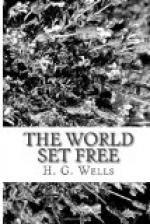‘I’m starving,’ he said to her abruptly.
‘Oh! poor dear!’ she said; and with the impulsive generosity of her kind, glanced round and slipped a silver piece into his hand....
It was a gift that, in spite of the precedent of De Quincey, might under the repressive social legislation of those times, have brought Barnet within reach of the prison lash. But he took it, he confesses, and thanked her as well as he was able, and went off very gladly to get food.
Section 8
A day or so later—and again his freedom to go as he pleased upon the roads may be taken as a mark of increasing social disorganisation and police embarrassment—he wandered out into the open country. He speaks of the roads of that plutocratic age as being ’fenced with barbed wire against unpropertied people,’ of the high-walled gardens and trespass warnings that kept him to the dusty narrowness of the public ways. In the air, happy rich people were flying, heedless of the misfortunes about them, as he himself had been flying two years ago, and along the road swept the new traffic, light and swift and wonderful. One was rarely out of earshot of its whistles and gongs and siren cries even in the field paths or over the open downs. The officials of the labour exchanges were everywhere overworked and infuriated, the casual wards were so crowded that the surplus wanderers slept in ranks under sheds or in the open air, and since giving to wayfarers had been made a punishable offence there was no longer friendship or help for a man from the rare foot passenger or the wayside cottage....
‘I wasn’t angry,’ said Barnet. ’I saw an immense selfishness, a monstrous disregard for anything but pleasure and possession in all those people above us, but I saw how inevitable that was, how certainly if the richest had changed places with the poorest, that things would have been the same. What else can happen when men use science and every new thing that science gives, and all their available intelligence and energy to manufacture wealth and appliances, and leave government and education to the rustling traditions of hundreds of years ago? Those traditions come from the dark ages when there was really not enough for every one, when life was a fierce struggle that might be masked but could not be escaped. Of course this famine grabbing, this fierce dispossession of others, must follow from such a disharmony between material and training. Of course the rich were vulgar and the poor grew savage and every added power that came to men made the rich richer and the poor less necessary and less free. The men I met in the casual wards and the relief offices were all smouldering for revolt, talking of justice and injustice and revenge. I saw no hope in that talk, nor in anything but patience....’




